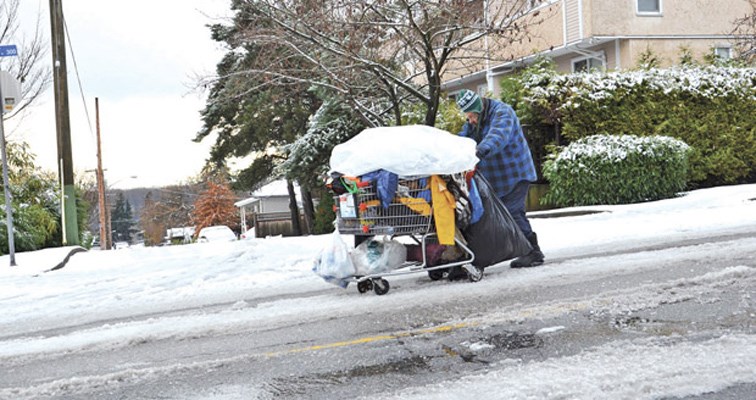It wasn't the winter wonderland people were hoping for before Christmas.
Tuesday in the Royal City saw a lot of people inconvenienced by an unexpected snowfall which turned streets into skating rinks by the morning commute.
According to Jon McDonald, the city's engineering operations manager, the city had staff on roads overnight pre-salting major streets in anticipation of the snow coming.
"This was an expected snowfall, but the timing of it is what made it a challenge," said McDonald. "We didn't expect it to hit just before rush hour and that's what made it difficult. We concentrate on areas where people want to be, meaning bus routes, schools and major roads. We can't be everywhere, but we're trying our best."
Derek Zabel, spokesperson for TransLink, said TransLink had to deal with congestion in the Royal City due to big lineups on both the Queensborough and Pattullo bridges. Both bridges had semi-trailer trucks jack-knifed on the bridges, backing up traffic for miles.
Sgt. Diana McDaniel agreed with Zabel: "We haven't noticed any major incidents but there was gridlock on those two bridges," she said. "The Queensborough Bridge was particularly bad and the lines to and from Marine Drive were really bad."
McDaniel said police officers didn't have to put chains on their squad cars and officers were doing their best to navigate the city's notoriously big hills.
Zabel said SkyTrain ran normally during Tuesday's rush hour, but bus service all throughout the Lower Mainland was slowed down by the snow.
"When there's snow, you'll see drivers searching for alternate routes. Those routes are often the bus routes that cities clear, so that means you get a lot more vehicles on the bus routes and that leads to some delays."
Zabel said TransLink also takes many preventative measures to ensure transit runs as close to normal as possible during snow events.
"With SkyTrain, we'll run them through the night and we'll also do some de-icing at Columbia and Waterfront stations," said Zabel. "With our trolley buses, we have trucks that will put de-icer on the trolley wires."
As for buses, Zabel said supervisors work closely to monitor the situation and problematic areas are identified and dealt with quickly.
McDonald said the city has eight trucks and most of them were on the road by just after 4: 30 a.m. In addition, McDonald's crews closed down four of the biggest hills because the salting trucks couldn't even navigate them.
"We've closed Merivale, Queens, Fourth Avenue and Third Avenue," said McDonald, who added the Tuesday afternoon rush hour doesn't look promising.
"It's supposed to be worse, so what we're doing is sending some people home to get some rest because we'll be needing them to do a 12-hour shift tonight," said McDonald. "We want them to get a good eight hours off before they get back out there."
As for what advice Zabel had for commuters, he said: "Build that extra time into your commute and you can also follow us on Twitter and get real-time info on how the buses are running."



